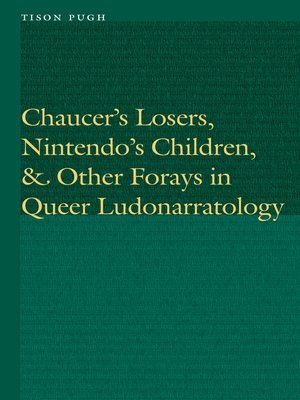Chaucer's Losers, Nintendo's Children, and Other Forays in Queer Ludonarratology
ebook ∣ Frontiers of Narrative
By Tison Pugh

Sign up to save your library
With an OverDrive account, you can save your favorite libraries for at-a-glance information about availability. Find out more about OverDrive accounts.
Find this title in Libby, the library reading app by OverDrive.



Search for a digital library with this title
Title found at these libraries:
| Library Name | Distance |
|---|---|
| Loading... |
Tison Pugh examines the intersection of narratology, ludology, and queer studies, pointing to the ways in which the blurred boundaries between game and narrative provide both a textual and a metatextual space of queer narrative potential. By focusing on these three distinct yet complementary areas, Pugh shifts understandings of the way their play, pleasure, and narrative potential are interlinked.
Through illustrative readings of an eclectic collection of cultural artifacts—from Chaucer's Canterbury Tales to Nintendo's Legend of Zelda franchise, from Edward Albee's dramatic masterpiece Who's Afraid of Virginia Woolf? to J. K. Rowling's Harry Potter fantasy novels—Pugh offers perspectives of blissful ludonarratology, sadomasochistic ludonarratology, the queerness of rules, the queerness of godgames, and the queerness of children's questing video games. Collectively, these analyses present a range of interpretive strategies for uncovering the disruptive potential of gaming texts and textual games while demonstrating the wide applicability of queer ludonarratology throughout the humanities.
Through illustrative readings of an eclectic collection of cultural artifacts—from Chaucer's Canterbury Tales to Nintendo's Legend of Zelda franchise, from Edward Albee's dramatic masterpiece Who's Afraid of Virginia Woolf? to J. K. Rowling's Harry Potter fantasy novels—Pugh offers perspectives of blissful ludonarratology, sadomasochistic ludonarratology, the queerness of rules, the queerness of godgames, and the queerness of children's questing video games. Collectively, these analyses present a range of interpretive strategies for uncovering the disruptive potential of gaming texts and textual games while demonstrating the wide applicability of queer ludonarratology throughout the humanities.







